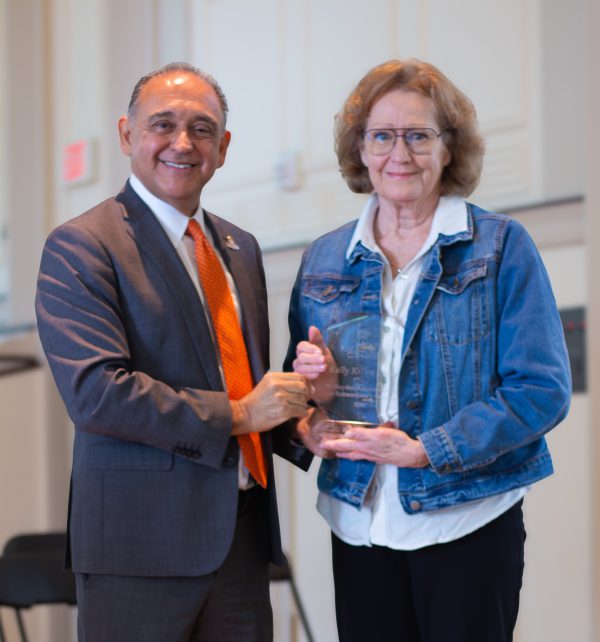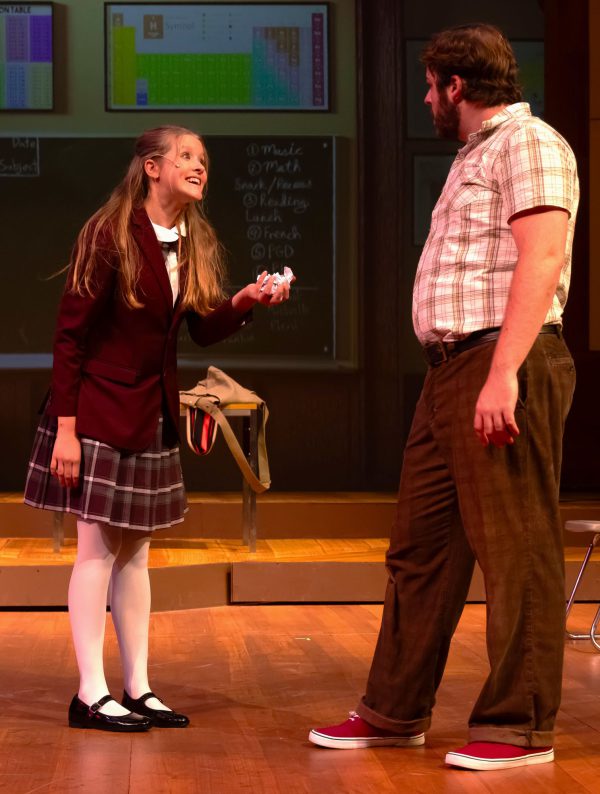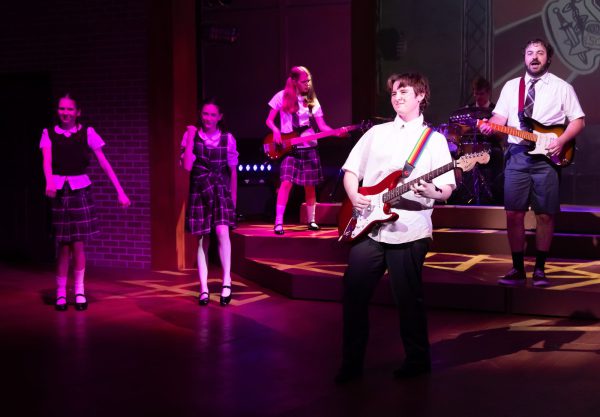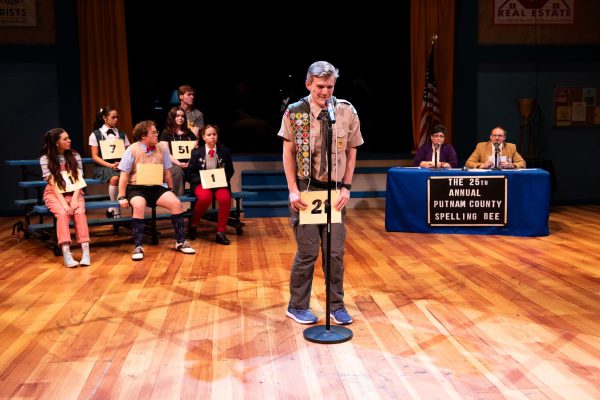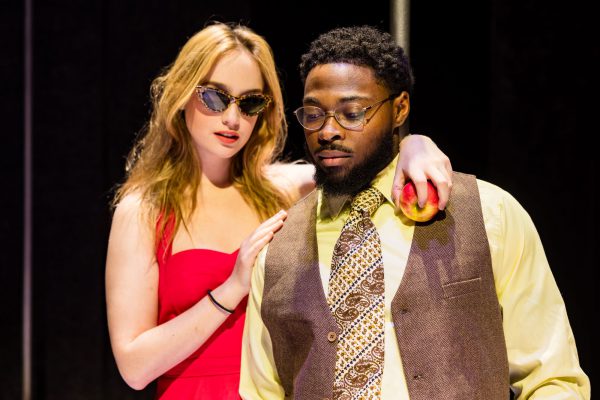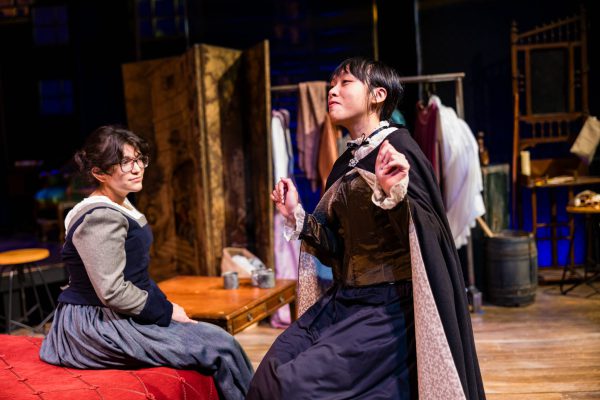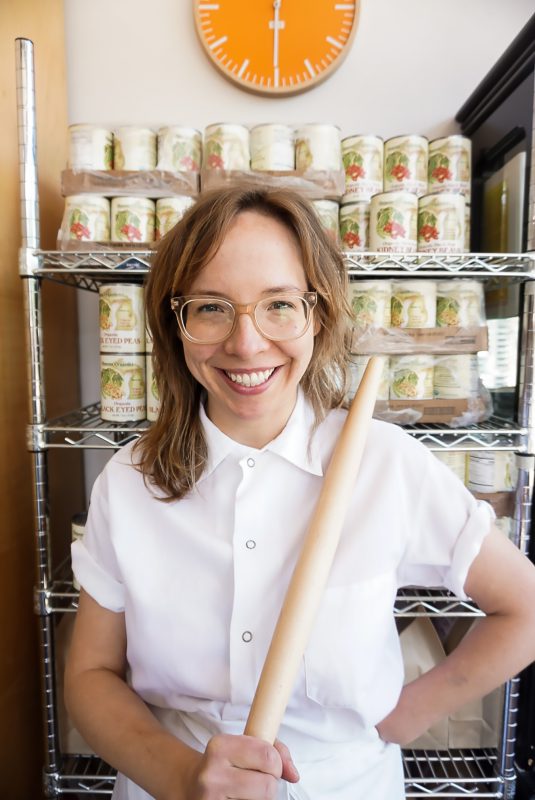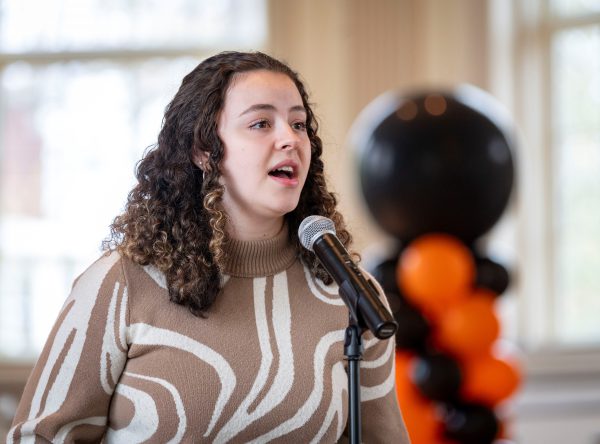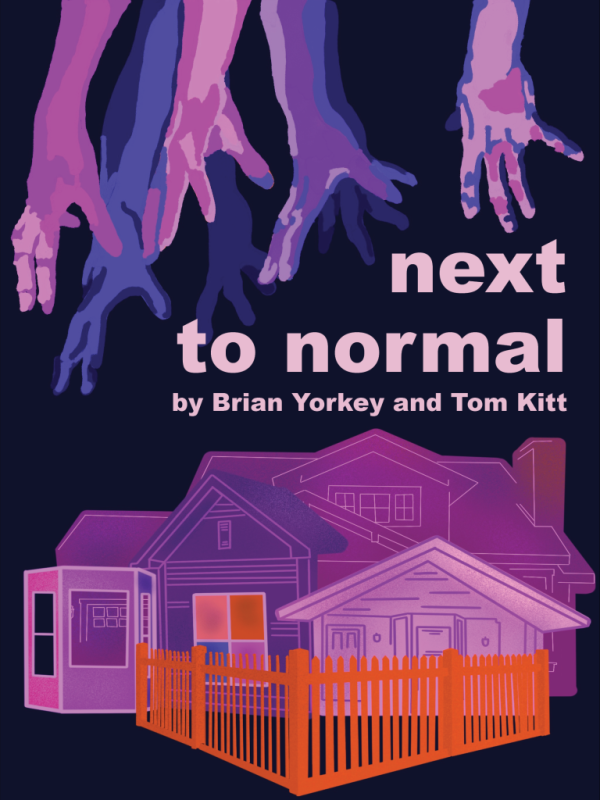Fade in. Night. New York City. A handsome man bearing a striking resemblance to Humphrey Bogart wears a fedora and trench coat. He wanders through a foggy Central Park, pondering the recent film successes of Kalamazoo College student Grace Cancro ’25. He realizes that she won her age group at the International Youth Silent Film Festival’s Detroit regional and received an honorable mention in the Kazoo 48 competition. He also recognizes her potential as a screenwriter, playwriter, producer and director, which could make hers a household name.
He smiles and says, “Here’s looking at you, kid.”
OK, so that script was never written, and the line belongs to a movie made more than 80 years ago. But Cancro has had an interest in classic movies—starring actors like Bogart—her entire life and her recent competitive success, starting with a family influence, is undeniable.
“I spent a lot of time at my grandparents’ respective houses and watched Turner Classic Movies for hours with my grandpa,” Cancro said. “I’ve also done theatre my whole life.”
With her love for the theatrical, the Redford Theatre—an art deco-decorated site in suburban Detroit that shows classic movies and plays, commonly featuring an organ that rises from the floor—is a significant place for her. Cancro notes that it’s where she saw Singin’ in the Rain for the first time. Plus, she and Audrey Schulz ’25 tried out there to be extras—by cheering during a boxing match—for a film that ultimately was shelved.
Now the Redford marks the spot where her own film, A Deadly Affair, was chosen as one of 20 finalists at the Detroit regional competition for the International Youth Silent Film Festival. It ultimately won the category for 19- to 22-year-old entrants, beating out filmmakers from most of the eastern half of the country. Cancro earned a cash prize, a plaque, a certificate, and a chance to compete June 9 in Portland, Oregon, at the festival’s next level.
“My mom and I are going to fly out to Portland together. There will be a parade and a dinner, and the contest is a really big thing for me,” Cancro said.
International Youth Silent Film Festival organizers provided entrants with three minutes of organ music across a variety of genres. Cancro—a theatre arts and English double major with a film and media studies concentration—chose film noir for her silent film. She then assembled some excited friends and shot A Deadly Affair near her residence, in downtown Kalamazoo near the walking mall, and in Bronson Park. Ian Burr ’24 served as the director of photography, also called a cinematographer. Schulz portrayed a wife betrayed by her on-screen husband, Ryan Muschler ’25. Schulz’s character meets up with her husband’s mistress, played by Josie Checkett ’25. Together, they decide to kill the husband.
After the screening, Cancro awaited word of her placement.
“They had the awards at the end and I was super nervous,” Cancro said. “I held my friends’ hands and I apologized if I squeezed so hard that I crushed a bone. Then, they called my name. It was the coolest experience, because six years after we tried out as extras, we were seeing Audrey’s name and mine while watching her face on the screen.”
Since the Detroit competition, she also has participated in the Kazoo 48, a film festival that challenges entrants to take an assigned genre, prop, character quirk, location and line of dialogue, and create a short film in just 48 hours. Her film-making team included Burr, Muschler, Schulz, James Hauke ’26, Aidan Baas ’23, Michael Robertson ’25, Abby Nelson ’24, Jakob Hubert ’25 and Mabel Bowdle ’25.
“Our genre was fantasy, so Michael Robertson’s character got super high and thought he was in a fantasy quest to build a stop sign,” Cancro said. “It was shot at Ian’s house, on the street and at Lowe’s. Michael went to Lowe’s to buy a shovel to put his stop sign in the ground. We had to go to Lowe’s with everyone in full fantasy gear. We wrote it on Friday night, shot it Saturday, edited it Saturday night and Sunday, and turned it in around 5:55 on Sunday when it was due at 6.”
The team was forced to enter the professional category because a couple of its members had earned money for film productions in the past, so in the end they couldn’t beat out film-production companies to win the contest. However, they were awarded with Best Use of Character for Hubert’s role as a character who gave advice in rhyme.
Cancro appreciates the opportunities she’s had at K that have developed her passion and skill at filmmaking. Her sophomore year, she participated in the New York Arts study away program, and she studied abroad in London her junior year. A playwriting class led by Assistant Professor of Theatre Quincy Thomas performed part of her self-written play—Sincerely, Scott—two years ago, leading her to create a 10-minute play festival for students, featuring the full play. Based partly on Cancro’s own life, the piece pondered what a man recovering from alcoholism might say in a letter to a daughter he’s never known before the two agree to meet. That festival will continue in its second year on June 1 with additional plays, comedy sketches and puppetry.
Now, armed with all these experiences, Cancro wants to return to New York, a place where she feels at home with many professional contacts, to film a mental-health themed Senior Integrated Project this summer. She plans to move there after graduation, hoping to mix in grad school while working in the film industry, perhaps with the nonprofit Women Make Movies (WMM), which distributes artistically significant films to audiences with a focus on uplifting the voices of the underrepresented.
Cancro has already worked with Women Make Movies in two internships with the first arranged through the New York Arts Program thanks in part to her software design experience in work study through K’s theater department. She then lived in a K graduate’s apartment last summer to work in a second internship with WMM. But whether it be through individual projects or a permanent job, Cancro recognizes the power of film, her talents and interests, and how they might combine to benefit society.
“Theater and film have the power to make people feel things and feel seen and that’s what it’s done for me,” Cancro said. “There’s merit in the adventure films that have CGI and explosions and all that. But I like to focus on the stuff that’s closer to the human experience, whether that be just my experience that I’m putting into a character on the screen or someone else’s experience. I want to put that into my art and have people watch it, think about it for long after, and feel it.”

